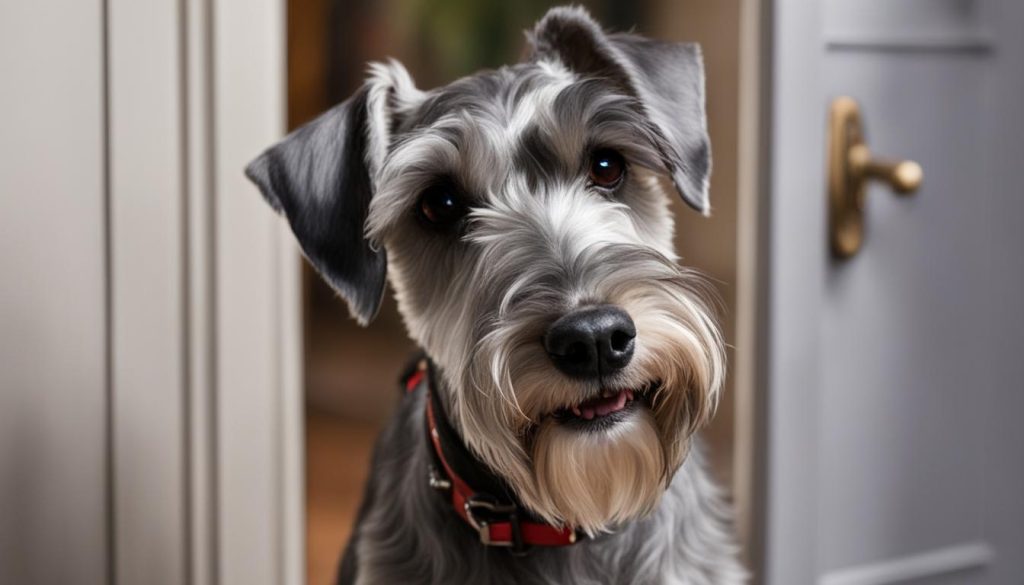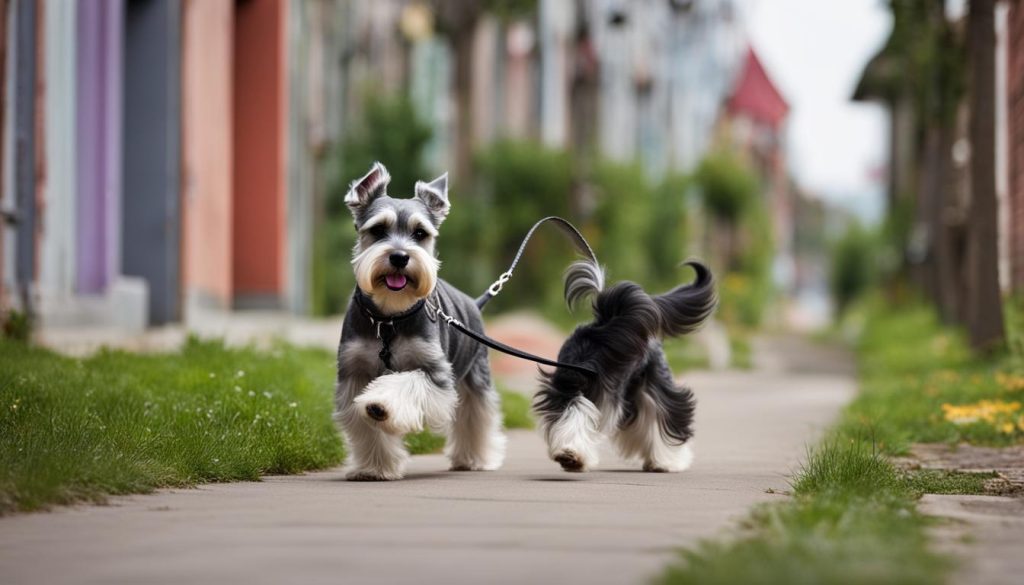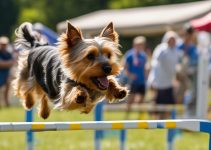Hello, fellow dog lovers! Today, I want to talk to you about Miniature Schnauzers and some common behavior issues they may experience. While Miniature Schnauzers are generally loving, sociable, confident, and smart dogs, it’s important to address any behavior problems that may arise.
Some Mini Schnauzers may display aggressive behavior, suffer from separation anxiety, exhibit excessive barking, engage in digging behavior, pull on the leash during walks, experience fear and phobias, or have housebreaking issues. These issues can be challenging, but with proper understanding and training, they can be managed effectively.
In this article, I will guide you through each of these behavior issues and provide you with practical tips and techniques to address them. Whether you are a first-time Miniature Schnauzer owner or have had one for years, this information will be valuable in maintaining a harmonious and joyful relationship with your furry friend.
So, let’s dive in and learn how to tackle Miniature Schnauzer behavior problems!
Understanding Separation Anxiety in Miniature Schnauzers
Separation anxiety is a common condition in Miniature Schnauzers, causing distress and behavioral issues when they are left alone. This anxiety can manifest in various ways and have a significant impact on both the dog’s well-being and the owner’s daily life.
When Miniature Schnauzers experience separation anxiety, they may become visibly upset, display continuous barking, eliminate in the house, engage in destructive behaviors such as chewing, show aggression, exhibit mood swings, and engage in excessive grooming.
Several factors contribute to the development of separation anxiety in Miniature Schnauzers. One common factor is the lack of strong human leadership, which can make the dog feel insecure and overwhelmed when left alone. Additionally, insufficient exercise and mental stimulation can contribute to anxiety problems. Making a big deal out of departures and returns can also increase a Schnauzer’s anxiety level, as it reinforces the significance of these events in their minds. Lastly, loneliness and the absence of companionship can intensify separation anxiety in these sensitive dogs.
To help alleviate separation anxiety in Miniature Schnauzers, it is essential to address these contributing factors. Building leadership by providing consistent rules and boundaries can help establish a sense of security for the dog. Regular exercise and mental stimulation are crucial in draining excess energy and reducing anxiety. Additionally, desensitization techniques and gradually increasing the duration of separations can help the dog become more comfortable being alone.
Training plays a significant role in managing separation anxiety. Using positive reinforcement methods, teaching the dog to associate being alone with rewards and comfort can create positive associations and reduce anxiety. Anti-anxiety supplements, such as CBD products, may also be considered under veterinary guidance to further alleviate stress and promote relaxation.
Dealing with Excessive Barking in Miniature Schnauzers
Excessive barking can be a common problem in Miniature Schnauzers, and it can be quite challenging for both the dog and their owners to manage. Miniature Schnauzers are known to bark excessively in response to various stimuli, such as a ringing doorbell, strangers, other animals, unfamiliar sounds, times of excitement, boredom, and the need for attention or affection.
When dealing with excessive barking in Miniature Schnauzers, it’s important to remember that punishment is not an effective solution. Instead, the focus should be on training the dog to understand when it is appropriate to bark and rewarding them for being silent. Positive reinforcement techniques can help teach your Miniature Schnauzer to differentiate between wanted and unwanted barking behaviors.
Distraction methods can also be helpful in preventing excessive barking. One effective approach is to use a can filled with pebbles or coins and shake it to create a distracting sound when your Miniature Schnauzer starts barking excessively. Another option is to consider using a bark-activated collar that emits a gentle signal or vibration to discourage barking.
Remember, consistency and patience are key when addressing excessive barking in Miniature Schnauzers. With proper training and positive reinforcement, you can help your furry friend develop better barking habits and create a harmonious environment for both you and your Miniature Schnauzer.

Managing Digging Behavior in Miniature Schnauzers
Miniature Schnauzers are known to engage in digging behavior, which can be a source of frustration for their owners. Understanding the reasons behind this behavior is key to effectively managing and redirecting it.
Miniature Schnauzers may dig out of boredom, excess energy, or instinctual tendencies. It’s important to provide them with mental and physical stimulation to address these underlying issues. Regular exercise, such as daily walks or play sessions, can help expend their energy and reduce the likelihood of digging. Interactive toys and puzzle games can also keep their minds engaged.
Another effective strategy is to create designated digging areas for your Miniature Schnauzer. These areas can be filled with soft soil or sand to simulate the feeling of digging. Encourage your dog to use this designated area by burying treats or toys in it, making it more enticing than other areas around your yard.
Using deterrents is another way to discourage digging behavior. For example, you can lay chicken wire or rocks over the areas your Miniature Schnauzer frequently digs. The uncomfortable texture or barrier may discourage them from continuing to dig in those spots.
If you catch your Miniature Schnauzer in the act of digging, it’s important not to scold or punish them. Instead, redirect their attention to an appropriate activity, such as playing with a toy or participating in a training session. Positive reinforcement for desirable behaviors and ignoring undesirable ones can be effective in shaping their behavior over time.
Remember, consistency is key when managing digging behavior in Miniature Schnauzers. With patience, training, and appropriate outlets for their energy, you can help redirect their digging instincts and promote more desirable behaviors.
Addressing Leash Pulling in Miniature Schnauzers
Leash pulling is a common problem in Miniature Schnauzers that can make walks unpleasant and difficult. If your Mini Schnauzer tends to pull on the leash, it’s important to address this behavior to ensure enjoyable and stress-free walks for both you and your furry friend.
To address leash pulling in Miniature Schnauzers, consistent leash training techniques should be used. One effective approach is teaching the “heel” command, which encourages your dog to walk beside you rather than pulling ahead. Start by walking with your Miniature Schnauzer on a loose leash and rewarding them with treats or praise when they stay by your side. Gradually increase the duration and distance of the walks while maintaining the “heel” position.
Another method is rewarding loose leash walking. Whenever your Miniature Schnauzer walks without pulling on the leash, reward them with treats, verbal praise, or a favorite toy. This positive reinforcement helps reinforce the desired behavior and encourages your dog to continue walking politely on the leash.
Patience and consistency are key when training your Miniature Schnauzer to walk nicely on a leash. It’s important to remain calm and composed, even if your dog pulls or gets distracted during walks. With time, practice, and positive reinforcement, your Miniature Schnauzer will learn to walk on a loose leash.
Proper equipment can also aid in leash training. Consider using a harness instead of a collar, as it provides more control and minimizes strain on your dog’s neck. Additionally, using a front-clip harness or a head halter can help redirect your dog’s attention and discourage pulling behavior.

Coping with Fear and Phobias in Miniature Schnauzers
Miniature Schnauzers, like any other dogs, can develop fears and phobias towards certain stimuli. Whether it’s loud noises, strangers, or car rides, these fears can significantly impact a Miniature Schnauzer’s well-being and quality of life. As a responsible owner, it’s crucial to understand how to help your furry companion cope with their fear and phobias.
One effective approach to address fear and phobias in Miniature Schnauzers is through gradual desensitization. This technique involves exposing your dog to the feared stimulus in a controlled and positive manner. For example, if your Schnauzer is afraid of car rides, start by sitting with them in a stationary car with treats or toys as distractions. Once they become more comfortable, gradually introduce short car trips, rewarding them for calm behavior.
Counter-conditioning is another valuable strategy. By pairing the feared stimulus with something positive, such as treats or toys, you can help create positive associations and alleviate your Miniature Schnauzer’s fear. For instance, if your dog is afraid of strangers, ask a friend to approach gradually while offering treats or engaging in a fun game.
If your Miniature Schnauzer’s fear and phobias persist or worsen, it may be necessary to seek professional help. A certified dog behaviorist or trainer can offer specialized techniques and guidance tailored to your dog’s specific needs. They can provide a comprehensive evaluation and create a customized behavior modification plan to address your Schnauzer’s fear issues effectively.
Remember, patience and consistency are key when helping your Miniature Schnauzer overcome their fears. By using positive reinforcement, gradual exposure, and professional assistance when needed, you can support your furry friend in building confidence and living a happier, fear-free life.
Overcoming Housebreaking Issues in Miniature Schnauzers
Housebreaking issues can be a common challenge when it comes to Miniature Schnauzers, especially during their puppyhood. However, with the right approach and consistency, these issues can be overcome successfully.
One of the key steps in resolving housebreaking issues is to establish a consistent routine. Set regular times for bathroom breaks, meals, and playtime. This will help your Miniature Schnauzer understand and anticipate when it’s time to relieve themselves.
Positive reinforcement is also crucial in the potty training process. Praise and reward your Miniature Schnauzer every time they exhibit desired bathroom behaviors, such as going outside or using a designated area. This positive reinforcement will help reinforce the correct behavior and motivate your dog to continue eliminating in the appropriate place.
To aid in the housebreaking process, crate training can be highly effective. A crate serves as a safe and comfortable space for your Miniature Schnauzer when you can’t supervise them. Dogs have a natural instinct to keep their living area clean, so using a properly sized crate can help prevent accidents and promote good bathroom habits.
Remember, patience and consistency are key. Housebreaking takes time and effort, but with the right training methods and a positive attitude, you can overcome housebreaking issues in your Miniature Schnauzer and enjoy a well-mannered, house-trained companion.






